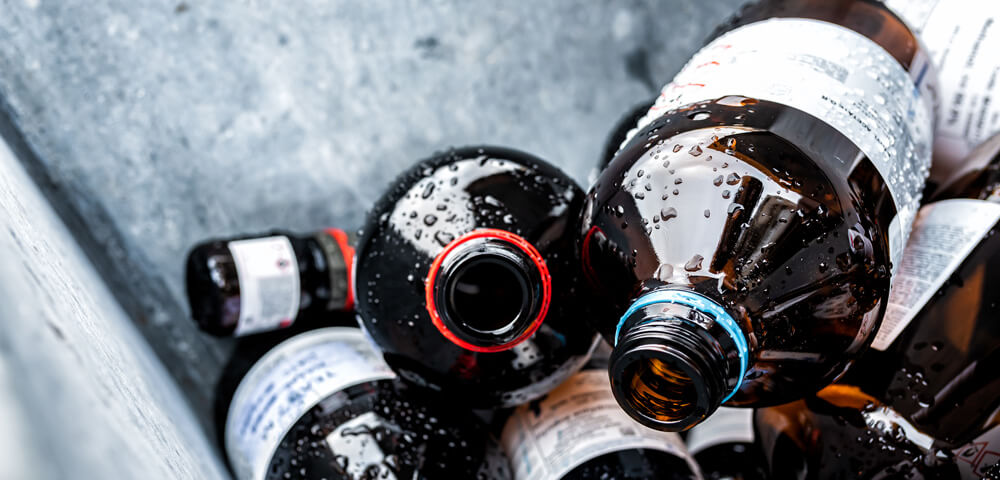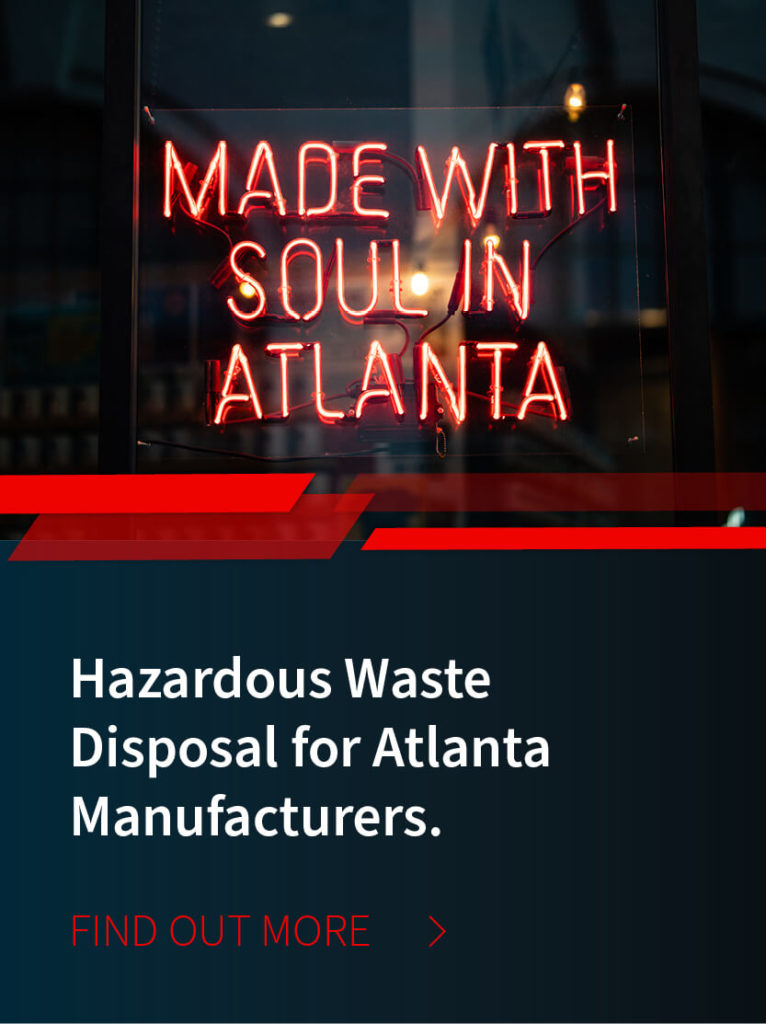
/ IN THIS BLOG
If you generate waste at your manufacturing facility or other business, it’s imperative you know whether that waste is hazardous or not. Why is this so important? The type of waste you have (whether hazardous or non-hazardous) determines how you need to handle, transport, and dispose of it. Because the rules vary according to the waste type (and because the generator of the waste is always liable for that waste), your very first step in any hazardous waste management plan should be determining the type of waste you have.
01 / What is the Difference between Hazardous and Non-Hazardous Waste?
Before you can begin to make plans about disposing of hazardous waste, you’ll need to be able to answer this question: What is hazardous waste?
The state of Georgia has adopted the guidelines of the Environmental Protection Agency and the regulatory content found within their Resource Conservation and Recovery Act (RCRA). Therefore, hazardous waste in Georgia is defined in the Federal Code of Regulations, Title 40, §261.3. In a nutshell, hazardous waste would exhibit any of the characteristics of hazardous waste.
Hazardous materials fall into one of two categories. The first is listed hazardous waste. This refers to anything that the EPA or other federal bodies (such as the RCRA) have specifically listed and named as hazardous. In terms of hazardous waste codes, these are either F, K, P, or U-listed materials.
The other type of waste is characteristic hazardous waste. A waste can be deemed hazardous if it is flammable, corrosive, reactive (with air, water, or anything else), or toxic. A hazardous waste code for this type of material is D-listed. For example, D001 indicates ignitable waste, while D002 means corrosive waste.
Whether characteristic or listed, all these materials qualify as RCRA hazardous waste.
02 / What Is RCRA Hazardous Waste?
The Resource Conservation and Recovery Act defines federal requirements that have been adopted, sometimes adapted to meet the greater needs of a state, and are enforced regulations designed to set consistent standards for storage, treatment, and disposal of hazardous waste in the country.
The act encourages a ‘cradle-to-grave’ approach to waste management (especially hazardous waste management). This means that the waste generator is the sole responsible party for compliant and safe hazardous waste management processes from the moment that waste is generated or produced until its final disposal – even after it’s left your facility.
Learn more about the RCRA here.
03 / Georgia Laws regarding Hazardous Waste Management
The state of Georgia follows the guidelines of the RCRA in regard to hazardous waste, but all waste generators and waste management companies should always realize that state laws must also be followed. In some cases, state laws regarding the treatment and disposal of hazardous waste are more stringent than those of the federal government.
All potentially hazardous waste generators should review Georgia’s laws regarding hazardous waste management. You can find the laws in Chapter 391-3-11 (Rules for Hazardous Waste Management) and proposed amendments at the Georgia Environmental Protection Division.
Under Chapter 391-3-11, waste generators will find regulations regarding:
- Identification and listing of hazardous wastes
- Applicable standards for hazardous waste generators
- Permits
- Inspections
- Enforcement
- Standards for owners and operators of hazardous waste treatment, storage, and disposal facilities
Be aware of not only the types and characteristics of your potentially hazardous waste, but the responsibilities of waste management companies that transport your waste off-site for disposal. It is your responsibility, from cradle-to-grave, to know what happens to that waste even after it’s transported off your facility site.
04 / Determining whether you have hazardous waste
Several methods are used to determine whether you have hazardous waste or non-hazardous waste to dispose of.
Analytical Testing – Have samples of your waste tested and analyzed at a qualified, experienced lab. If the test results show you do have non-hazardous waste, the permits required to transport that waste are much less stringent than those regarding hazardous waste. The process for non-hazardous waste disposal is also less rigorous and involved than for hazardous material.
MSDS and SDS Sheets - Another way to determine if you have non-hazardous material is through SDS sheets (safety data sheets). These documents (formerly known as the materials safety data sheet, or MSDS sheet) tell you exactly what chemicals are included in the product/s you’re using at your facility and the composition of that material.
It will also stipulate if transport of that material is regulated for DOT purposes. If it is, it’s an indication you have hazardous materials on hand—whether that’s because it’s flammable, corrosive, poisonous, etc.
Because of the recent global switch from MSDS to SDS sheets, you’re more likely to get a uniform, consistent, and accurate DOT description now than you did in the past. Just keep in mind that any product that’s a few years old might still have an associated MSDS sheet that may contain outdated information regarding DOT regulations. If the documentation is incomplete or unclear, you’ll want to rely on analytical testing or a waste management company to deal with your potential hazardous waste treatment.
You can also review resources of the RCRA available here for more information regarding hazardous waste regulations of the federal government and its enforcement guidelines.
05 / Maintaining Hazardous Waste Disposal Compliance
Work with a hazardous waste disposal company that offers full-service waste management processes. A full-service company will have the proper permitting, insurance, and licensing to legally identify, handle, and transport many waste types. They’ll also have the knowledge to correctly dispose of hazardous waste.
As a waste generator, you are legally liable for everything that happens with it—from its inception to its ultimate disposal. Even if you work with a third party, you are still responsible for the waste.
This is where expertise and experience come in. Choose a company like MCF Environmental Services that has decades of experience dealing with hazardous and non-hazardous materials. Choosing a company without experience and in-depth knowledge regarding hazardous waste processes can lead to dire and financially devastating ramifications for you, the facility owner.
For more information about how to properly identify hazardous waste or how to legally dispose of it, contact a representative of MCF Environmental Services, a full-service Atlanta-based waste management company.
Robert Losurdo
President, COO








